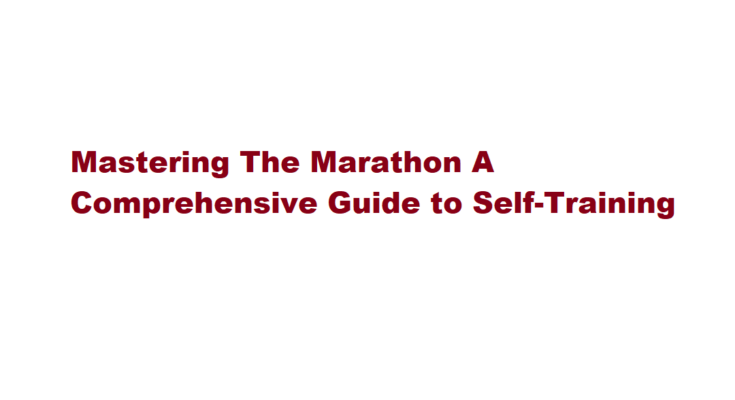Introduction
Running a marathon is a remarkable achievement that requires dedication, perseverance, and meticulous preparation. While many runners seek the guidance of professional coaches, self-training for a marathon is a challenging yet rewarding endeavor. In this article, we’ll delve into the essential steps and strategies to prepare yourself for a marathon successfully.
Establish Clear Goals
Before you lace up your running shoes, set clear and achievable goals. Determine the specific marathon you want to participate in and establish a realistic time frame for your training. Goals provide motivation and direction, helping you stay committed throughout the training process.
Create a Training Plan
A well-structured training plan is the backbone of marathon preparation. It should encompass a gradual increase in mileage and incorporate various types of runs, including long runs, tempo runs, and interval training. Research different training programs or consult with experienced runners to create a plan tailored to your fitness level and goals.
Build Your Base
Starting with a strong running foundation is crucial. Begin your training by focusing on increasing your weekly mileage gradually. This will help prevent injuries and prepare your body for the demands of marathon running. Aim to build a solid base of at least 20-30 miles per week before moving on to more intense workouts.
Proper Nutrition and Hydration
Nutrition plays a vital role in marathon training. Fuel your body with a balanced diet rich in carbohydrates, proteins, healthy fats, and plenty of fruits and vegetables. Stay hydrated by drinking water throughout the day and consider using sports drinks during long runs to replenish electrolytes. Consult with a registered dietitian to create a personalized nutrition plan.
Cross-Training and Strength Training
Incorporate cross-training activities like swimming, cycling, or yoga to improve your overall fitness and reduce the risk of overuse injuries. Additionally, regular strength training sessions will help develop the necessary muscle groups to support your running and maintain good form.
Listen to Your Body
One of the most critical aspects of self-training for a marathon is listening to your body. Pay attention to any signs of fatigue, soreness, or discomfort. Rest and recovery are equally important as training. Incorporate rest days into your schedule to allow your body to heal and prevent burnout.
Long Runs and Simulated Races
Long runs are the cornerstone of marathon training. Gradually increase the distance of your long runs to mimic the marathon’s length. These runs help build endurance and mental toughness. Consider incorporating simulated races (half marathons or 20-mile runs) into your training plan to practice race-day strategies and gauge your progress.
Race Day Preparation
As race day approaches, simulate your marathon experience during your long runs. Practice your pre-race routine, including nutrition and hydration strategies. Familiarize yourself with the marathon course if possible, and visualize a successful race to boost your confidence.
Tapering
In the final weeks leading up to the marathon, taper your training by reducing mileage and intensity. This allows your body to recover fully and ensures you’re well-rested and ready for race day. Trust in your training and avoid the temptation to overtrain during this period.
Mental Toughness
Marathon running is as much a mental challenge as it is physical. Develop mental toughness by practicing positive self-talk, visualization, and goal setting. Embrace the inevitable ups and downs during training and remember that overcoming challenges will make you a stronger and more resilient runner.
Race Day Execution
On race day, stick to your plan. Start conservatively to avoid burning out early. Stay hydrated, and fuel according to your pre-established strategy. Focus on maintaining a steady pace and break the marathon into smaller, manageable segments. Draw inspiration from the crowd and fellow runners.
Post-Race Recovery
After crossing the finish line, your marathon journey isn’t over. Proper post-race recovery is essential to ensure a smooth transition back into your regular training routine. Rehydrate, refuel, and indulge in some well-deserved rest. Reflect on your race performance and use the experience to set new goals for the future.
Frequently Asked Questions
How do I train myself for a marathon?
The goal is to get comfortable running three to four times a week, with your longest run being roughly 5 or 6 miles. Pushing yourself too far too fast could result in injuries, so make sure to take your time: you can start by running 1 or 1.5 miles and build up week after week. And remember that it’s okay to walk!
What is the 6 week marathon training plan?
At six weeks out, you should be aiming to complete two 4 mile runs and two 6 mile runs in the week, with a long weekend run of around 12-14 miles. With five weeks to go, you should stay with the short run distance, adding 4 miles onto the long run distance.
Conclusion
Training yourself for a marathon is a challenging but achievable goal with the right dedication and preparation. By establishing clear goals, creating a structured training plan, and paying attention to your body’s signals, you can conquer the marathon distance. Remember that marathon running is a journey of self-discovery, resilience, and determination, and with the right mindset and preparation, you can cross that finish line with pride and accomplishment.
Read Also : Building a Robust Social Media Strategy A Blueprint for Success



